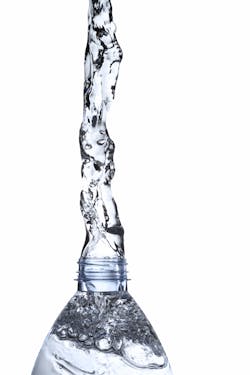Research Shows Predicted Health Payoffs Of Switching From Sugar-Sweetened Beverages To Water
Alexandria, VA –– Losing weight and improving risk factors for chronic diseases may be as easy as drinking a glass of water instead of a soda or other sweetened beverage, according to a new study published in the peer-reviewed journal Nutrients.
The study, funded in part by the Drinking Water Research Foundation (DWRF), is the first to use national nutrition surveillance data to report beverage intake patterns for adults and predict the calorie savings, weight loss benefits and other potential health benefits associated with drinking a glass of water in place of a soda, energy drink or other sweetened beverage.
“Swapping water for eight-ounces of sweetened beverage every day could save people roughly 100 calories, which is between 15 and 30 percent of adults’ total energy intake,” commented the study’s co-author, Kiyah Duffey, PhD, Virginia Tech. “If those calories are not replaced by other foods or beverages, that is a meaningful reduction in daily energy intake.”
Study results revealed that 18 percent of calories in adults’ diets come from beverages. Current public health recommendations limit beverage calories to less than 15 percent of total daily calories.
Among the 250 million adults in the U.S. (33 percent of whom are overweight) that change alone would trim 3.9 billion calories per day from adults’ diets. The predicted weight loss from such calorie reductions could mean that 1.6 million fewer adults would be officially classified as overweight. “In addition to the potential direct weight loss benefits, individuals may also experience improvements in blood sugar and cholesterol levels,” suggested Dr. Duffey. “We also know that most adults are at least mildly dehydrated and need to consume more calorie-free beverages like water, so there are numerous reasons to make the swap.”
Using dietary and health data from more than 19,000 adults from National Health and Nutrition Examination Surveys (2007-2012), Dr. Duffey and co-author Jennifer Poti, Ph.D., University of North Carolina, Chapel Hill, analyzed beverage intake patterns and compared participants’ beverage choices to current public health recommendations and associations with health parameters. The researchers also assigned a 0-100 Healthy Beverage Index (HBI) score for all participants.
The HBI is a 10-item index that scores beverage patterns based on public health recommendations such as drinking at least 20 percent of your fluids as water, limiting sugar-sweetened beverages, and keeping overall calories from beverages low. Higher HBI scores are associated with beverage patterns that are more consistent with public health recommendations and are associated with better health, including lower blood pressure and better cholesterol and blood sugar levels.
The 2015-2020 Dietary Guidelines for Americans recommend limiting added sugars to less than 10 percent of total calories. The Guidelines also recommend replacing beverages with added sugars with no-sugar added beverages, like water. “While Americans may be drinking less soda, our data show that calories from beverages are still exceeding public health recommendations, and often by a wide margin,” commented Dr. Duffey.
Among the majority of study participants, consumption of sugar-sweetened beverages also exceeded the HBI recommendations. More than 40 percent of adults reported drinking at least one sugar-sweetened beverage per day. Adults over age 50 consumed the least sweetened beverages and had the highest HBI scores.
The study confirms several previously published reports revealing that adults regularly drink at least one serving of sugar-sweetened beverages on most days. As a result, those who drink sugary beverages often exceed public health nutrition guidelines designed to improve overall dietary patterns, weight management and reduced risk for chronic diseases, including heart disease and type 2 diabetes.
